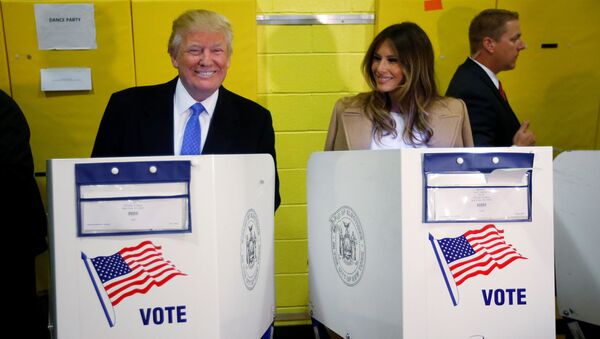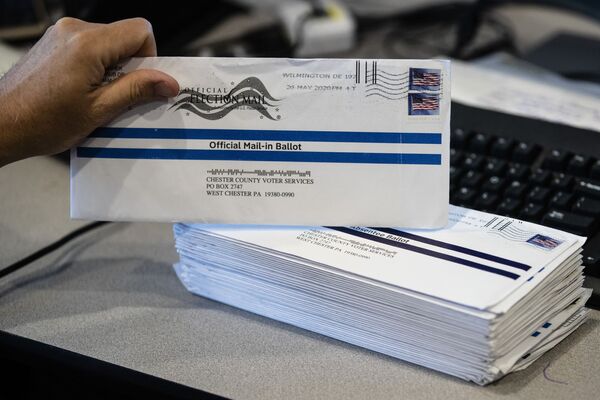President Trump has ramped up his rhetoric about the possible danger of large-scale voter fraud using mail-in ballots, asking whether the November 3 presidential election should be delayed “until people can properly, securely and safely vote,” and warning that universal mail-in voting could make the 2020 vote “the most inaccurate and fraudulent election in history.”
Trump’s derision of mail-in voting goes back months. In May, the president threatened to withhold funds from Michigan and Nevada after they announced plans to mail voters absentee ballots for state and federal elections. The Republican Party, meanwhile, filed lawsuits contesting California Democratic Governor Gavin Newsom’s decision to send absentee ballots to all residents ahead of the 2020 election, but dropped the suits earlier this month.
Can Trump Actually Legally Delay the Election?
- Trump’s opponents have over 175 years of precedent to challenge any potential effort by the White House to postpone the November vote. In 1845, a year after the successful testing of the Morse electric telegraph, which allowed near-instantaneous communication from coast to coast, Congress mandated a single national date for the presidential election to take place: the Tuesday after the first Monday in November. In the proceeding 175 years, the president has been chosen in elections taking place between November 2 and November 8, every four years.
- Theoretically, Congress does have the ability to push elections forward or back. But doing so would require approval from both the House (presently controlled by the Democrats) and the Senate (controlled by Republicans, many of whom have supported the very same mail-in voting scheme that Trump has decried). The change could only be made through a new constitutional amendment, which would require two-thirds majority support from both the House and the Senate, or a constitutional convention called by two thirds of state legislatures, followed by approval of the amendment by three quarters of these same state legislatures.
- Even if Trump and Congress miraculously did agree to postpone Election Day, the Twentieth Amendment to the US Constitution sets out a clear end date for a president’s term: 12:00 noon on January 20. According to the rules of presidential succession, either Nancy Pelosi, speaker of the House, or the longest-serving member of the majority party in the Senate, would inherit Trump’s post. At the moment this could either be 86-year-old Iowa Republican Senator Chuck Grassley, or 80-year-old Vermont Democratic Senator Patrick Leahy.
- Delving further into the realm of fantasy, if the coronavirus situation proves serious enough that states chose to cancel the election altogether, state legislatures themselves could vote to determine which candidate wins their state. The last time this happened was in 1860, when South Carolina chose its electors to the Electoral College through its state legislature.
What’s Trump Concerned About?
Supporters of mail-in ballots argue that the dangers of voting fraud from mail-in ballots are miniscule, and have dismissed President Trump’s concerns as unfounded.
Others have pointed to numerous potential problems with mail-in voting based on the results of past elections, from votes being ‘lost by mail’ to ballots being rejected for arriving late by no fault of the voter. Earlier this month, National Public Radio, a liberal left non-profit radio network that’s anything but supportive of Trump, discovered that at least 65,000 absentee or mail-in ballots were rejected in the Democratic primary elections earlier this year, with these accounting for as much as 1 percent of total votes in many states. Furthermore, Black and Latino voters were said to have been affected by these discrepancies disproportionately.
In its own investigation, conservative think tank The Heritage Foundation pointed to other problems, all of them associated with the lack of supervision by election officials, which it alleged made it “easier to steal, forge, or alter” ballots, “as well as to intimidate voters.”
Last month, Dr. Harvey Schantz, a professor of political science at the State University of New York at Plattsburgh, told Sputnik that in theory, mail-in ballots can be a very good thing, since they make it easier for people to vote and therefore increase turnout. At the same time however, he stressed that in a tight race, checking the validity of mail-in ballots may be more difficult, making it crucial to properly supervise mail-in voting to address any fears of fraud.





